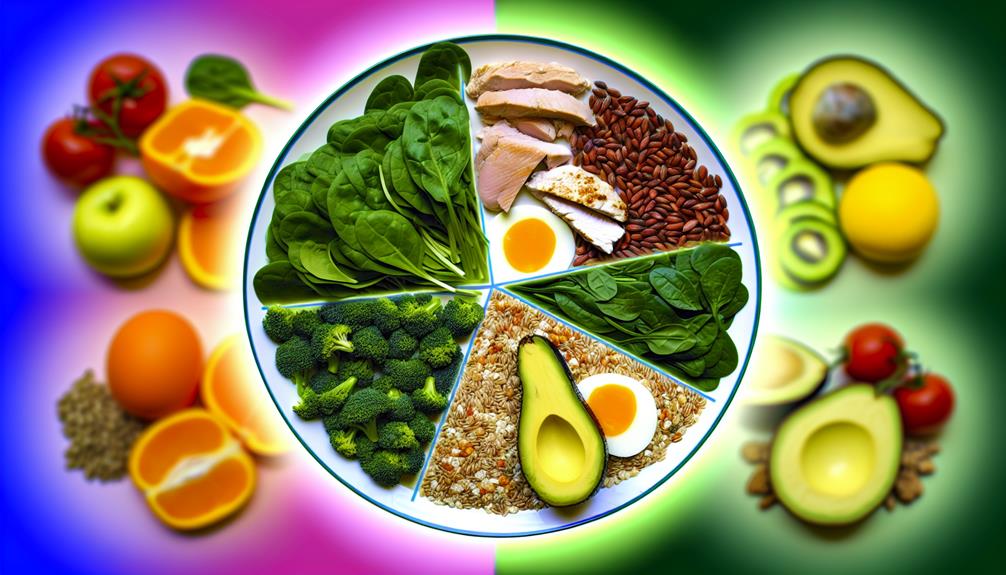You may have heard of individuals who, after incorporating Lean Bliss into their daily routine, experienced a noticeable increase in energy levels, improved mood, and better control over their cravings. But have you ever wondered why nutrition plays such a crucial role in enhancing the effects of Lean Bliss? The science behind nutrition and its impact on our overall well-being is a complex and fascinating subject. Understanding how the nutrients we consume interact with our bodies at a cellular level can provide valuable insights into how Lean Bliss can be further optimized to support your health goals. Whether you are seeking to manage your weight, regulate blood sugar levels, or improve your overall health, delving into the science of nutrition may hold the key to unlocking the full potential of Lean Bliss.
Understanding Macronutrient Ratios
Understanding macronutrient ratios is essential for optimizing your nutrition and achieving your personal health and fitness goals. The balance of carbohydrates, proteins, and fats in your diet plays a crucial role in various aspects of your health, including weight management, energy levels, and metabolic processes. When it comes to LeanBliss, a weight loss supplement, paying attention to macronutrient ratios becomes even more significant. For instance, maintaining healthy blood sugar levels is key for effective weight management and overall well-being. By stabilizing blood sugar levels, you can enhance insulin sensitivity and promote a healthy balance of glucose levels in the body. This, in turn, supports the effectiveness of LeanBliss in aiding weight loss.
Additionally, understanding macronutrient ratios can also have a profound impact on physical performance. The right balance of macronutrients supports muscle growth, endurance, and faster recovery during exercise. Whether your goal is to shed pounds, gain muscle, or improve athletic performance, tailoring your macronutrient ratios to your specific objectives is essential. By aligning your diet with your fitness goals, you can maximize the benefits of LeanBliss and achieve optimal results.
Importance of Micronutrient Optimization
To optimize the effects of LeanBliss and further enhance your health and fitness goals, it is imperative to recognize the significance of micronutrient optimization in supporting vital bodily functions and overall well-being. Micronutrients, including vitamins and minerals, play a crucial role in promoting energy levels, hormone balance, and cellular function. These essential nutrients are also important for supporting weight management and metabolism, as deficiencies can impact energy levels and metabolic processes. Adequate intake of micronutrients is vital for maintaining healthy blood sugar levels, which is essential for overall well-being and preventing chronic diseases. Moreover, micronutrient optimization supports the body's ability to repair and recover, promoting overall vitality and wellness.
In the context of Lean Bliss, micronutrient optimization is particularly important for enhancing the effects of this supplement. The science behind Lean Bliss underscores the significance of micronutrients in supporting its weight loss support and antioxidant properties. By ensuring that your body receives optimal levels of micronutrients, you can maximize the benefits of Lean Bliss and support its mechanisms for enhancing metabolism and promoting overall health. Therefore, incorporating a well-rounded nutrition plan that focuses on micronutrient optimization is essential for complementing the effects of Lean Bliss and achieving your desired health and fitness outcomes.
Impact of Nutrition on Lean Muscle Mass

You need to understand the impact of nutrition on lean muscle mass to maximize your workout results. Consuming adequate protein is crucial for muscle repair and growth, while carbohydrates provide the energy needed for workouts and muscle recovery. Additionally, staying properly hydrated is essential for optimal muscle function and recovery.
Protein for Muscle Growth
Protein is an essential component for supporting muscle growth and repair, playing a crucial role in optimizing the effects of LeanBliss Supplement. Consuming protein before and after workouts can support muscle recovery and growth. Amino acids from protein are the building blocks of muscle tissue. Combining protein with resistance training can optimize muscle growth. Different protein sources have varying absorption rates and amino acid profiles, impacting muscle growth differently. When considering a blend of natural ingredients like LeanBliss, it's important to note the role of protein in supporting healthy weight loss and fat burning. The proprietary blend of natural ingredients, including Ceylon cinnamon bark, works in conjunction with protein to enhance the overall effects on muscle growth and fat burning.
Carbs and Energy
When considering the impact of nutrition on lean muscle mass, it's essential to understand the role of carbohydrates in providing the body with the necessary energy for physical activity and muscle recovery. Carbohydrates are the body's primary source of energy and consuming them before and after workouts can replenish glycogen stores, aiding in muscle recovery and growth. The type and timing of carb intake can impact energy levels, with complex carbs providing sustained energy and simple carbs offering quick energy boosts. Balancing carb intake with protein and fat can optimize energy utilization and support weight management. Monitoring carb intake is crucial for individuals aiming to enhance lean muscle mass while managing body composition. Ingredients like corosolic acid in certain carbs may also provide an energy boost, support healthy cholesterol levels, and combat excess fat through their anti-inflammatory and antioxidant properties.
Importance of Hydration
Carbohydrates play a crucial role in providing the energy necessary for physical activity and muscle recovery, and similarly, proper hydration is essential for maintaining lean muscle mass and overall health. When it comes to supporting healthy weight loss and promoting holistic health, staying adequately hydrated is key. Here's why:
- Proper hydration supports muscle function, energy levels, and endurance during workouts.
- Dehydration can impair muscle recovery and growth, impacting lean muscle mass.
- Adequate hydration is crucial for nutrient delivery to muscles and removal of waste products.
Incorporating LeanBliss into your diet can further enhance these health benefits, but it's essential to remember that hydration is a fundamental pillar of overall health and optimizing the effects of any supplement.
Role of Nutrition in Body Composition

You may not realize it, but the food you eat plays a major role in shaping your body composition. Nutrient-rich foods provide the building blocks for lean muscle mass and help regulate fat distribution. By paying attention to your macronutrient and micronutrient intake, you can optimize your nutrition to support your body composition goals.
Nutrition and Body Composition
Ensuring a balanced and nutrient-rich diet is crucial for optimizing body composition, including muscle mass and fat percentage. Consuming adequate protein supports muscle growth and repair, contributing to a leaner body composition. Balancing macronutrients, such as carbohydrates and fats, regulates energy intake and supports body composition goals. Micronutrients like vitamins and minerals are essential for various metabolic processes that impact body composition. Hydration and proper fluid balance are important for optimizing body composition and overall physical performance.
- Adequate protein intake supports muscle growth and repair
- Balancing macronutrients regulates energy intake
- Micronutrients impact body composition and metabolic processes
Macronutrients and Lean Mass
To optimize lean mass gains and improve body composition, it is essential to prioritize a balanced intake of macronutrients, including protein, carbohydrates, and fats. Protein plays a crucial role in supporting lean muscle mass, aiding in muscle recovery, and facilitating fat loss. Carbohydrates provide the necessary energy for workouts, replenish glycogen stores, and support muscle growth. Fats are important for hormone regulation, absorption of fat-soluble vitamins, and overall health, contributing to supporting lean mass while reducing body fat. Balancing the intake of these macronutrients is key to optimizing body composition and promoting lean mass gains. When combined with LeanBliss, a science-based approach to nutrition, a balanced macronutrient intake can enhance the effects of weight loss and lean muscle development. Therefore, it is essential to understand and incorporate the role of macronutrients in achieving desired body composition and lean mass.
Micronutrients for Muscle
Transitioning from the discussion of macronutrients and their impact on lean mass, it is essential to now delve into the role of micronutrients in supporting muscle growth and repair. Micronutrients such as vitamins and minerals play a crucial role in optimizing muscle function and aiding in recovery after exercise. Key micronutrients for muscle health include vitamin D, calcium, magnesium, and iron, all of which contribute to muscle strength and endurance. Consuming a variety of nutrient-dense foods like fruits, vegetables, and lean proteins ensures that you get a range of essential micronutrients for muscle maintenance. Additionally, micronutrient deficiencies can impair muscle function and athletic performance, making it important to prioritize a balanced diet rich in essential vitamins and minerals.
Nutritional Strategies for Enhancing Energy Levels

For optimal energy levels, incorporating a balanced and nutrient-dense diet is essential. When it comes to enhancing energy levels, it's important to focus on nutritional strategies that support overall well-being. One effective way to enhance energy levels is by supporting weight loss, which can lead to increased energy. LeanBliss is a supplement that offers a range of benefits, and its formula contains ingredients that can help enhance energy levels.
To enhance energy levels, it's crucial to focus on consuming a balanced diet that includes a variety of macronutrients such as carbohydrates, proteins, and healthy fats. Carbohydrates are the body's primary source of energy, and incorporating complex carbohydrates like whole grains, fruits, and vegetables can provide a sustained release of energy throughout the day. Proteins and healthy fats also play a crucial role in supporting energy levels and overall well-being.
In addition to macronutrients, micronutrients such as vitamins and minerals are essential for optimal energy production in the body. B vitamins, in particular, are known for their role in converting food into energy, and incorporating foods rich in B vitamins, such as leafy greens, nuts, and seeds, can help enhance energy levels.
Nutrition's Influence on Metabolism
As you consider enhancing your energy levels through nutritional strategies, it's important to understand the significant influence that nutrition has on metabolism. Research suggests that nutrition plays a crucial role in influencing metabolism, impacting the body's ability to efficiently convert food into energy. Here are some key points to consider:
- Impact of Different Foods: Different foods and nutrients can affect metabolism differently. For instance, protein requires more energy to digest than fats or carbohydrates, potentially leading to a temporary increase in metabolic rate after a high-protein meal.
- Meal Timing and Hydration: Eating regular, balanced meals and staying hydrated can help keep metabolism running optimally. Skipping meals or prolonged fasting can slow down metabolism as the body tries to conserve energy.
- Spices and Physical Activity: Certain spices and herbs, such as cinnamon, may have metabolism-boosting properties and can be incorporated into the diet. Additionally, engaging in regular physical activity can enhance metabolism, helping the body burn more calories even at rest.
Understanding how nutrition influences metabolism is essential, especially when considering the effects of supplements like LeanBliss. By incorporating these nutritional strategies into your daily routine, you can potentially optimize your metabolism, suppress appetite, and support the body's ability to manage fat storage effectively. Always remember to consult with a healthcare professional for personalized nutrition recommendations and to ensure that any supplements, including LeanBliss, are used at the recommended dosage.
Nutritional Support for Recovery and Repair

Considering your body's need for recovery and repair, incorporating specific nutritional support can significantly enhance your overall well-being and physical resilience. Nutrition plays a vital role in the recovery and repair processes, and certain nutrients can support these functions effectively. Here are some scientifically proven nutritional support strategies to aid in your recovery and repair:
| Nutritional Support | Benefits |
|---|---|
| Protein Intake | Essential for muscle repair and recovery |
| Antioxidants | Reduce inflammation and support cellular repair |
| Omega-3 Fatty Acids | Aid in reducing muscle soreness and tissue repair |
| Hydration | Supports the body's ability to repair and recover |
| Micronutrients | Vitamin C, D, and Zinc support immune system and tissue repair processes |
Incorporating these nutritional strategies into your diet can enhance the effects of Lean Bliss and promote a quicker recovery and repair process. Adequate protein intake supports muscle repair, while antioxidants found in fruits and vegetables help reduce inflammation. Omega-3 fatty acids aid in reducing muscle soreness and promoting tissue repair. Staying well-hydrated is crucial for the body's ability to repair and recover, especially after physical activity. Micronutrients such as vitamin C, D, and zinc play a pivotal role in supporting the immune system and tissue repair processes. By incorporating these nutritional supports into your diet, you can optimize your recovery, repair, and overall health.
Nutrition's Effect on Hormonal Balance
Maintaining a balanced and nutritious diet is crucial for supporting hormonal health and function. Nutrition plays a pivotal role in influencing hormonal balance, which in turn impacts various aspects of health, including weight management, body fat distribution, and blood sugar levels. Here's how nutrition affects hormonal balance:
- Balanced Macronutrients: Consuming adequate amounts of protein, healthy fats, and complex carbohydrates is essential for supporting hormonal health. Protein is necessary for synthesizing hormones, while healthy fats, such as omega-3 fatty acids found in salmon and chia seeds, play a crucial role in hormone production and function. Complex carbohydrates provide a steady source of energy, which helps regulate insulin levels and, in turn, supports hormonal balance.
- Nutrient-Dense Foods: Nutrient deficiencies can disrupt hormonal balance and overall health. Consuming a varied and nutritious diet that includes a wide range of vitamins, minerals, and antioxidants is crucial for supporting hormonal function. Ensuring adequate intake of nutrients like vitamin D, magnesium, and zinc is particularly important for hormonal health.
- Avoiding Processed Foods and Added Sugars: Limiting the consumption of processed foods and foods high in added sugars can help prevent hormonal imbalances. These types of foods can lead to fluctuations in blood sugar levels and insulin resistance, which can disrupt hormonal equilibrium and contribute to adverse health effects.
Understanding the impact of nutrition on hormonal balance is vital for enhancing lean bliss's effects and promoting overall health. By prioritizing a balanced and nutrient-rich diet, individuals can support their hormonal health and optimize their well-being.
Frequently Asked Questions
Can Nutrition Really Improve Mood and Mental Well-Being?
Can nutrition really improve mood and mental well-being? Absolutely! Nutrition plays a crucial role in the gut-brain axis, affecting mood, brain health, and serotonin production. Consuming mood foods and maintaining a balanced microbiome can positively impact emotional eating and overall mental well-being. Nutritional psychiatry emphasizes nutrient absorption for mental health, highlighting the profound link between what you eat and how you feel.
How Does Hydration Play a Role in Nutrition and Its Effects on the Body?
Staying hydrated is crucial for overall health. Proper hydration is essential for maintaining electrolyte balance, cellular hydration, and supporting optimal performance, metabolism, and muscle recovery. It also plays a role in cognitive function, exercise, and weight management. Dehydration can negatively impact all these aspects, so it's important to prioritize hydration throughout the day. Aim to drink enough water and consume hydrating foods to support your body's needs.
Are There Specific Foods or Nutrients That Can Help With Reducing Inflammation and Promoting Overall Health?
Incorporating anti-inflammatory foods, a nutrient-rich diet, and balanced macronutrients can help reduce inflammation and promote overall health. Omega-3 fatty acids, antioxidant foods, and probiotic benefits support gut health, while lean protein sources provide essential nutrients. Emphasizing a variety of whole foods can optimize your nutrition, supporting your body's natural defense against inflammation and contributing to overall wellness.
What Role Does Timing of Meals and Nutrient Intake Play in Maximizing the Benefits of Nutrition for Lean Muscle Mass and Energy Levels?
Meal timing and nutrient intake play a crucial role in maximizing the benefits of nutrition for lean muscle mass and energy levels. Proper timing can optimize nutrient absorption and metabolic impact, supporting muscle growth and enhancing performance. Strategic dietary strategies can help regulate energy levels throughout the day, promoting sustained energy and overall well-being. Understanding the impact of meal timing and nutrient intake can lead to effective strategies for maximizing the benefits of nutrition for muscle growth and energy levels.
How Does Individual Variability and Genetic Factors Impact the Effectiveness of Nutrition on Body Composition and Metabolism?
When it comes to the impact of genetic factors and individual variability on nutrition's effectiveness for body composition and metabolism, it's crucial to recognize the influence of diet quality, nutrient absorption, exercise synergy, and dietary strategies. Genetic factors can play a role in how your body processes nutrients, but through personalized dietary approaches and lifestyle modifications, you can optimize your body's response to nutrition for improved body composition and metabolism.
